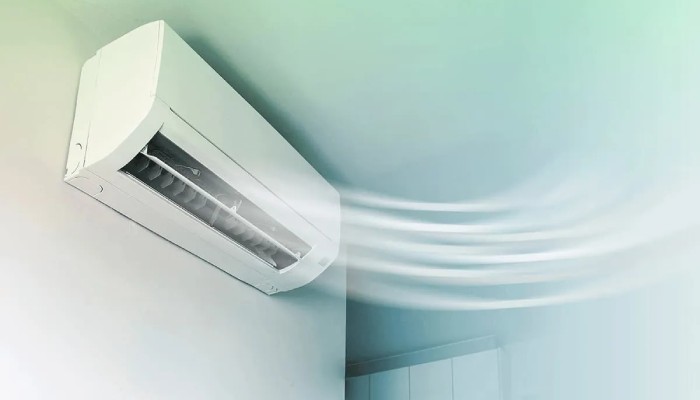Why Do Air Conditioners Leak Water? – Common Causes and Fixes

An air conditioner is a vital appliance, especially during those hot summer months. However, if you notice water leaking from your air conditioner, it can be quite alarming. Understanding why do air conditioners leak water can help you address the issue promptly and prevent further damage.
In this Blog, we will explore the common reasons why air conditioners leak water, how to identify the problem, and what you can do to fix it.
How Air Conditioners Work
Before diving into the reasons for leaks, it’s essential to understand how air conditioners work. Air conditioners cool your home by removing heat and humidity from the air. They do this by drawing warm air over a cold evaporator coil. As the air cools, moisture condenses on the coil and drips into a drain pan, which then funnels the water outside through a drain line.
Why Do Air Conditioners Leak Water? – Common Causes
Clogged Drain Line
One of the most common reasons for an air conditioner leaking water is a clogged drain line. Over time, dirt, dust, and debris can build up in the drain line, causing a blockage. When the drain line is clogged, the water has nowhere to go and starts to overflow, leading to leaks.
Dirty Air Filter
A dirty air filter can also cause your air conditioner to leak water. When the air filter is clogged, it restricts airflow over the evaporator coil, causing it to freeze. Once the coil starts to thaw, the excess water may overwhelm the drain pan and lead to leaks.
Low Refrigerant Levels
Low refrigerant levels can cause the evaporator coil to become too cold and freeze. Similar to the issue with a dirty air filter, when the coil eventually thaws, the resulting water can overflow the drain pan and cause leaks.
Damaged or Rusted Drain Pan
The drain pan collects the water that drips off the evaporator coil. If the drain pan is damaged or rusted, it may not hold water properly, leading to leaks. Over time, drain pans can develop cracks or holes, especially in older units.
Improper Installation
Improper installation can also be a reason why your air conditioner is leaking water. If the unit is not level, water may not flow properly into the drain pan, causing it to spill over the sides. Additionally, incorrect sizing or placement of the unit can cause drainage problems.
Identifying the Problem
Check the Air Filter
Start by checking the air filter. If it’s dirty, replace it with a new one. A clean air filter ensures proper airflow over the evaporator coil and prevents it from freezing.
Inspect the Drain Line
Inspect the drain line for clogs. You can use a wet/dry vacuum to clear any blockages or run a stiff wire through the line to remove debris. Regular maintenance of the drain line can help prevent future clogs.
Examine the Drain Pan
Check the drain pan for any signs of damage or rust. If you find any cracks or holes, you may need to replace the drain pan to stop the leaks.
Look for Ice on the Evaporator Coil
If you notice ice on the evaporator coil, it could be due to low refrigerant levels or a dirty air filter. In this case, it’s best to call a professional ac service provider to diagnose and fix the issue.
Ensure Proper Installation
If you suspect that the air conditioner was not installed correctly, contact a professional to assess the installation. They can ensure that the unit is level and properly sized for your space, preventing drainage problems.
Preventing Air Conditioner Leaks
Preventing air conditioner leaks involves regular maintenance and timely repairs. Here are some tips to keep your air conditioner in good working condition:
Regularly Change Air Filters
Changing the air filter every 1-3 months can prevent clogs and ensure proper airflow. This simple step can significantly reduce the risk of your air conditioner leaking water.
Clean the Drain Line
Regularly cleaning the drain line can prevent clogs and ensure that water flows smoothly out of the unit. You can use a wet/dry vacuum or a stiff wire to clear any debris from the line.
Schedule Professional Maintenance
Scheduling annual air conditioner maintenance contract (ac amc) with a professional ac service provider can help identify and address potential issues before they become major problems. They can check refrigerant levels, inspect the evaporator coil, and ensure that all components are in good working condition.
Monitor for Signs of Damage
Keep an eye out for any signs of damage or rust on the drain pan, and address any issues promptly. Replacing a damaged drain pan can prevent leaks and extend the life of your air conditioner.
Ensure Proper Installation
If you’re installing a new air conditioner, make sure to contact a reputable ac service professional to ensure that the unit is installed correctly. Proper installation can prevent drainage issues and improve the overall performance of your air conditioner.
Conclusion
Understanding why your air conditioner is leaking water and taking steps to address the issue can prevent further damage and ensure that your unit operates efficiently. Common reasons for leaks include clogged drain lines, dirty air filters, low refrigerant levels, damaged drain pans, and improper installation.
By regularly maintaining your air conditioner, changing air filters, cleaning the drain line, and scheduling professional maintenance, you can prevent leaks and extend the life of your unit. If you encounter any issues that you’re unable to fix yourself, don’t hesitate to contact a professional ac service provider like star-airconditioning for assistance.
By following these tips, you can keep your air conditioner in good working condition and enjoy a cool, comfortable home all summer long.


